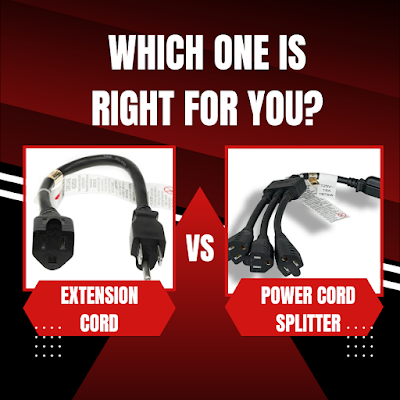Power Splitter vs. Extension Cord: Which One Is Right for You
Power distribution is a crucial aspect of managing electrical devices efficiently. When faced with the need to connect multiple devices to a single power source, two popular options come to mind: power splitters and extension cords. Understanding the differences between these two solutions is essential to ensuring optimal power management and safety. In this article, we will explore the features, applications, and considerations associated with power cord splitters and extension cords, helping you make an informed decision on which one is right for your specific needs.
-
Power Splitters: Unleashing Versatility
Power splitters, also known as cord splitters or power cable splitters, are designed to divide a single power source into multiple outlets. These devices allow you to connect several devices simultaneously, expanding the number of electrical connections available. Power cord splitters come in various configurations, including three-way, four-way, and even more complex models, depending on your requirements.
-
Extension Cords: Extending Your Reach
Extension cords provide an extended length of power cable, enabling devices to be connected to a power source located further away. They offer flexibility and convenience in scenarios where the power outlet is not easily accessible or when devices need to be used at a distance. Extension cords come in different lengths and may have multiple outlets built into them, allowing you to connect multiple devices simultaneously.
-
Key Differences and Considerations
Choosing between a power splitter and an extension cord depends on various factors. Here are some key differences and considerations to help you make an informed decision:
- Power Management:
Power splitters are primarily used for distributing power among multiple devices in close proximity. They are ideal for setups where devices need to be powered simultaneously from a single power outlet. On the other hand, extension cords focus on extending the reach of the power source, allowing devices to be used at a distance.
- Safety:
Safety is paramount when dealing with electrical connections. Power splitters are designed to handle the power load they are rated for, ensuring safe power distribution. Extension cords should be chosen based on the power requirements of the devices being connected and the length of the cord to prevent overloading and voltage drop.
- Distance:
If the devices you need to power are located far from the power source, an extension cord is the more suitable option. However, if the devices are in close proximity, a power splitter can efficiently distribute power without the need for extra cable length.
Keywords: choosing between power splitter and extension cord, power cord splitter versus extension cord, power splitter cable or extension cord
-
Applications and Scenarios:
Understanding the specific applications and scenarios where power splitters and extension cords excel can further guide your decision:
a. Power Splitters:
Power splitters are commonly used in home entertainment setups, computer systems, workshops, and offices where multiple devices need to be connected simultaneously. They are also useful for trade shows, exhibitions, and events that require temporary power distribution.
b. Extension Cords:
Extension cords find their utility in situations where devices need to be used outdoors, such as garden equipment, holiday lighting, or construction sites. They are also handy in situations where the power source is located far from the devices being used, like in large meeting rooms or stage setups.
Conclusion
In summary, both power splitters and extension cords serve distinct purposes in power distribution. Power splitters are ideal for connecting multiple devices in close proximity, while safe extension cords extend the reach of the power source. By considering your specific requirements, power demands, and safety considerations, you can determine whether a power splitter or an extension cord is the right choice for your needs. Always prioritize safety and adhere to the manufacturer's guidelines when using electrical devices and connections.
Also read: - Growing Use of AC Power Cord Splitters




Comments
Post a Comment